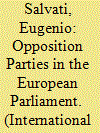| Srl | Item |
| 1 |
ID:
172703


|
|
|
| 2 |
ID:
179381


|
|
|
|
|
| Summary/Abstract |
The different crises which have affected the European Union (EU) since 2008, have triggered a major politicisation of European integration. This dynamic makes it of utmost importance to understand how parties act within the European Parliament (EP), in order to gauge whether it is possible to identify a parliamentary opposition which is Eurocritical but not Eurosceptic.
|
|
|
|
|
|
|
|
|
|
|
|
|
|
|
|
| 3 |
ID:
143328


|
|
|
|
|
| Summary/Abstract |
Ideally, national legislatures in democracies should be venues for peacefully resolving conflicts between opposing groups. However, they can become places of physical violence. Such violence can be an indication that countries’ legislative institutions are functioning far from the democratic ideal of being venues for peaceful conflict reconciliation. In some cases, such as Ukraine prior to the 2014 outbreak of armed conflict in the country’s east and south, violence can indicate and possibly fuel deeper political divisions. In this first global study of legislative violence, I show that brawls are more likely when legislators find it difficult to credibly commit to follow peaceful bargains. Credible commitment problems are more acute in countries with new democracies and disproportionate electoral outcomes – that is, when electoral votes for parties do not closely correspond to the legislative seats they are given. I find robust support for this argument by first examining a case study of legislative violence in the antebellum United States Senate. Pro- and anti-slavery senators became increasingly unable to maintain credible commitments in the lead-up to the 1856 caning of Senator Charles Sumner as the allocation of seats in the legislative body became more disproportional. Second, I find further support for my argument in a new global dataset of contemporary instances of violence in national legislatures. In addition, I find strong evidence that violence is more likely in legislatures with small minority governments. Despite reasonable expectations, civil wars are not associated with more legislative violence.
|
|
|
|
|
|
|
|
|
|
|
|
|
|
|
|
| 4 |
ID:
169443


|
|
|
|
|
| Summary/Abstract |
Where does the UAE’s Federal National Council fit in the scholarship on comparative legislative studies? Is it a “transformative” and “active” assembly (i.e. it makes legislation and policy) or is it an “arena” and “reactive” assembly (i.e. it focuses on public debate and policy influence)? Constitutionally, the FNC is portrayed as one of the Arabian Gulf region’s weaker assemblies. This article challenges that assumption. An analysis of the FNC’s media coverage in two newspapers in 2011–15 shows that its members’ actions resulted in the body acquiring a more expansive role. Members went beyond their formal revising powers of bills to propose legislation and funding and challenge ministers. The analysis also identifies members’ subject priorities (i.e. the economy and social security) and backgrounds, including more media attention accorded to members from smaller/poorer emirates (i.e. not Dubai and Abu Dhabi) and little difference between those who were elected and appointed.
|
|
|
|
|
|
|
|
|
|
|
|
|
|
|
|